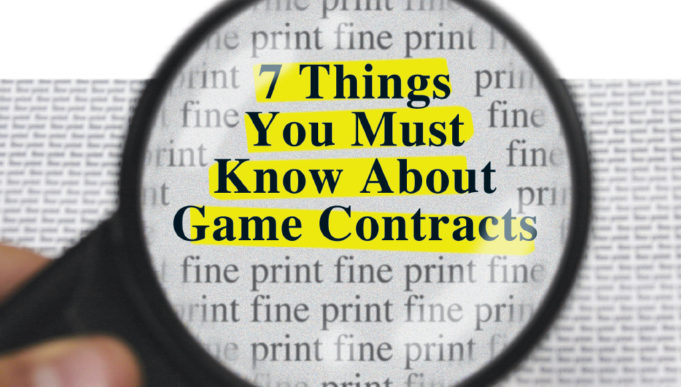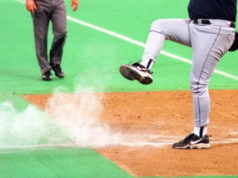By Alan Goldberger
Game contracts are a part of officiating. Every officiating assignment — at every level — represents a contract or part of a contract. Contracts are the vehicles that bring your game assignments to you. At the end of the day, contracts do more than that — they define an official’s rights and responsibilities.
Just like every sport has ground rules, there are rules that go with game contracts. Officials need to know those rules.
1. What is a Contract?
An old lawyer (older even than me) once said: “In the legal business, when we want somebody to sign something we call it an agreement. When we don’t want them to sign it, we call it a contract.” In truth, there is no difference between the two. The term “contract” simply denotes an agreement between two or more parties that creates legal obligations. So, a contract is really not a piece of paper with writing on it, but a meeting of the minds, marked by an exchange of promises. Sometimes, but not always, contracts are put in writing. Either way, in a game contract, the expectations and the obligations of the assigner and the official come to life: I promise to work the game. You promise to pay me a game fee. If it were only that simple. Now that we know what a contract is, what else do we need to know?
2. The Essential Elements Parts of a Contract.
Contracts have “recitals” and “decretals.” Recitals in contracts are basically the contract’s mission statement: They give some of the background and reasons behind the parties forming their agreement.
Decretals include who does what, including the obligations that we have to officiate, the event, the responsibility of the league, school or organization to pay us, and everything in between. Representations is a fancy word for statements made by the contracting parties: What do you promise to do? What’s your background? Who are you? Who are your partner(s)? What are your credentials or accreditations, which in some states would be licensing and in some states, certification.
Independent contractor descriptors are a good thing to put in the contract to help determine if we’re independent contractors or employees. Can a contract assure that officials, coordinators and assigners are independent contractors? No, but contracts that describe the nature of the assignment sure can help.
If we are the assigning agency, obviously we need to put in the contract at least the following:
- Who’s playing.
- What they are playing.
- Where it is going to happen.
- How much we are going to pay.
- What time we have to get there.
- How many officials will work the game.
- Their positions.
Is it a good idea to include items such as security, parking, the locker room and the site manager? Yes and no. If you are the assigning agency, of course, you don’t want to promise anything you can’t deliver. If you are the official, you’d like to see all those items in your contract. Either way, those are topics that are adequate fodder for officiating contracts.
3. Whose Party is This?
Who are the parties to our game contracts? In the area of game contracts, the nature of the industry tells us we have a big cast of characters. Assigners, leagues and conferences immediately come to mind. In some areas teams engage officials directly or indirectly. At various levels of sport, sponsoring entities, youth programs and other entities will reach out to officials or their associations. And don’t forget that municipalities and other public entities engage officials, as well as officials associations. All of those persons, institutions and organizations could be parties to a contract to officiate.
Often we have officials engaged by one person or entity to work for another. A good example is college conferences will engage referees or umpires who are not working for the conference, rather working for the home school that is required to pay the officials, the contracts so recite.
From the official’s perspective, know who you are working for; often the person assigning the games is not the person who pays the game fees!
4. Creating a Legal Relationship.
Does a contract need to be in writing? Not necessarily, but it definitely helps avoid misunderstandings to have a well-written agreement. How about third-party companies and the electronic method of assigning? Many assignments are made via email and various proprietary software applications. Regardless of the medium — software, email, web-based — or if the contract is parchment, a notepad or on the back of an envelope, all can be evidence of a valid contract.
Regardless of the form, it is what’s in the contract that creates the obligations and rights. In recent years, Internet and email-based game assignments have streamlined the process. At the same time, questions arise. If you are making assignments, what kind of arrangements do you have with the assignment agency? Is the assignment agency also the one facilitating the payment of your game fees? Questions we want to be asking include: Where are the fees parked until the time they actually go out to the officials in the form of a deposit, a debit card or check? If you are on the assigning or hiring end of the contract, make sure that the company you deal with is insuring or segregating those particular funds and that you can get the money back if needed. If you are on the officiating side of the deal, make sure you know who is paying you regardless of whether it’s check, cash, electronic funds transfer or direct deposit.
The legal relationship aspect speaks to whether or not officials are independent contractors or employees. Contrary to public opinion, there is often no black or white answer to that question. Rather, the answer will often depend on a particularized analysis of a number of factors. From the hiring entity’s point of view, if you’re concerned about making officials independent contractors, a key strategy is to educate and train just as much as you can (that’s what we’re about as officials). We want to regulate and control only as much as we need to, but no more.
Our contracts outline who does what as far as working a game and who was assigned by whom and whom that official is working for. Beyond that, the statement that you are an independent contractor because it says so in the contract may work and it may not.
5. Contractual Ground Rules.
Every game has ground rules and that is no different with game contracts. The ground rules obviously have a lot to do with the standard of performance. How do referees and umpires conform to fulfill their contracts?
Woody Allen said, “Showing up is 80 percent of life.” But that’s not quite enough in our line of work. Now, it’s what happens before and after the game that can get us in legal difficulty, in public relations difficulty and in all kinds of difficulty that we need to be concerned with in our contracts. For that reason, game contracts need to deal with the before and after part as well. Therefore, game contracts should incorporate by reference, for example, “a high school basketball game under NFHS rules” or, in some cases, the applicable casebook and the manual. Tell them what rules we are playing by. That really helps a lot. Those are the ground rules of contracts.
No matter the sport, somebody is watching from the time we arrive till the time we drive away with or without the police escort. Pregame and postgame deportment has become an important part of game contracts.
For example, a well-drafted contract could outline pregame and postgame deportment, including proscriptions regarding comments about teams and personalities or actions that detract from the appearance of impartiality that all successful officials must maintain.
6. What If?
In addition to the basics covered, game contracts allocate responsibility when the wheels come off the wagon. How can that possibly happen? Well, what if the game is off? Obviously there are cancellations, everything gets cancelled once in a while, even a wedding or two. Certainly a ballgame, once in a while, gets cancelled. What happens if the game starts, but it doesn’t finish? Environmental factors could have an impact on that, and other reasons like civil insurrection or the officials couldn’t control the game, which might lead to early termination. Lots of things can happen with games that start and don’t finish, like games that start and finish badly or games that don’t start at all.
What happens if the officials don’t show up? What do we do? Do we cover it in our contracts? We should. What happens if the official sends a substitution, but forgets to tell Mr. Assigner or Ms. Commissioner? What do you do in that case? Suppose both coaches do not want a particular referee, even if there were no other officials available on the face of the earth? What happens if we have aberrational conduct where the game is on, but the official is off? Unfortunately, reports of bizarre conduct of officials acting in an antisocial and aberrational manner abound. Sometimes that results in officials being asked to leave by the governing authority. What do you do in those cases? Do you have it covered? Does your contract earn its money?
Officials have administrative responsibilities after the game as well.
Recent NFHS rule changes in most sports specify that the officials’ job is not over until all required reports and correspondence are completed after the game. Therefore, we may still have some work to do after the game, particularly if there were disqualification or worse. That work should be provided for in your game contract.
Social media sites often feature sports officials with photographs posted, some with conference affiliations or officials with high school affiliations who have said, “I worked for Joe Smith at West Dingbat High School last week, and I’m working for him next week, and he’s not going to get away with what that crew let him get away with two weeks ago.” It happens. Officials who inhabit social media sites and talk about personalities are looking for trouble. Many officials don’t think about the consequences of ill-advised digital gossip. That’s why we have to address social media in our contracts.
7. Short-Term Benefits – Long-Term Exposure.
As officials, we are what the retailers and the marketers call seasonal merchandise. The economics of officiating often dictate how many games an official will get, who he or she will work with, and if he or she will have to work with that official again. The official may declare that he or she “deserves a better schedule than that.” Truth be told, whatever contract an assigner offers, officials are likely to sign because they get to work. So, basically, if you’re an assigner, an administrator or an assigning agency, you get to choose your weapon — choose whomever you want to send to the game consistent with your association’s regulations.
Hopefully, you get to cover the game and you get to dictate the terms.
Finally, if your officials are your employees and you are their employer, you may be responsible for the mistakes they make that result in legal liability. The questions that will be asked in many cases: Who hired these guys? What did they do about training them? Don’t you supervise them? Do they often let the game get out of control? In most cases, should litigation arise, the question becomes, “What did they do about supervising?”
Those are some of the key elements that cover the legal landscape of game contracts. While the list is not all-inclusive, an understanding of the basics can help navigate the ground rules of contracts for officials and their assigners.
What's Your Call? Leave a Comment:
Note: This article is archival in nature. Rules, interpretations, mechanics, philosophies and other information may or may not be correct for the current year.
This article is the copyright of ©Referee Enterprises, Inc., and may not be republished in whole or in part online, in print or in any capacity without expressed written permission from Referee. The article is made available for educational use by individuals.



















